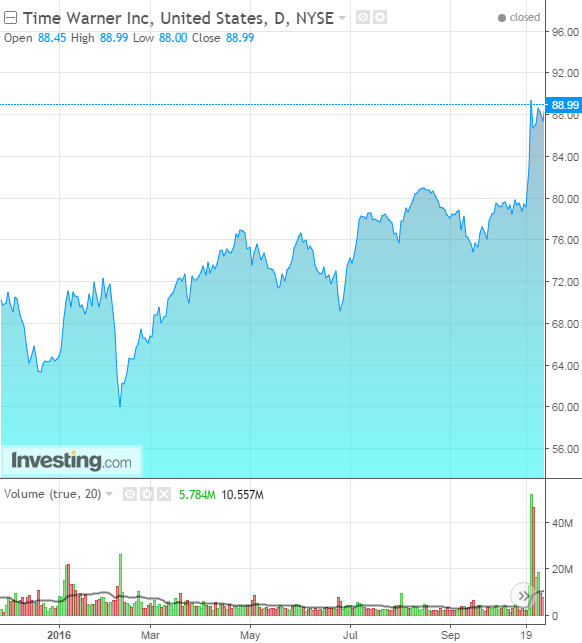by Clement Thibault
Time Warner Inc. (NYSE:TWX) is a US-based, global media and entertainment conglomerate. It reports Q3 2016 earnings on Wednesday, November 2, before the market opens.

NB: TWX is currently the world's third largest entertainment company in terms of revenue after Comcast (NASDAQ:CMCSA) and The Walt Disney Company (NYSE:DIS). On October 22, AT&T (NYSE:T) announced it plans to acquire Time Warner, and the deal is expected to close by the end of 2017.
1. Earnings and Revenue
Time Warner is expected to report earnings of $1.36 per share on $6.98 billion in revenue. Revenue is expected to show growth of 6.46% from Q3 2015, continuing the trend that's emerged over the past four quarters when Time Warner alternated between positive and negative revenue growth each quarter. Time Warner earnings have been more consistent; they grew every quarter over the past year and are expected to have grown by 9.15% this time around.
2. Turner Broadcasting
Turner is Time Warner's biggest operating segment by far, bringing in 43% of the company's revenue. It's the division that operates CNN, TNT and Cartoon Network as well as additional news and entertainment networks, in over 200 countries worldwide. The company also has a stake in sports media; it owns the websites of Bleacher Report and operates NBA.com, among others. This segment has been growing steadily for the past three years, and its three major revenue drivers (subscriptions, ads, and content related syndication revenue) are on the rise.
The division's annual revenue last year was $10.5 billion. Should the growth trajectory that's taken place since the beginning of 2016 sustain its momentum, revenue should grow by an additional 9%, spurred mainly by higher subscription numbers, more than the 2% and 4% growth achieved during 2015 and 2014 respectively for this segment.
3. Warner Bros. Entertainment
Warner Bros. is the company's second largest division, bringing in 38% of Time Warner's overall revenue. Warner Bros. produces, distributes and licenses TV and film productions such as The Big Bang Theory for TV and such moves as Suicide Squad and the recently released The Accountant. The division's theatrical offerings—which includes film rentals and home video—are, unsurprisingly, on the decline given the rise of streaming services such as Netflix (NASDAQ:NFLX).
Because revenue from the theatrical segment also depends on the timing of movie releases or TV series' debuts, it can be difficult to make YoY or even QoQ comparisons. However, after three years of top line growth, revenue from Warner Bros.' television group seems to have stagnated this year. Still, its bottom line is expected to grow because the division has cut back on advertising, lowering expenses by 21% so far this year. Even though the top line isn't growing, overall, it appears management is finding a way to make the most of every dollar spent, a good sign going forward for the production studio.
4. Home Box Office
HBO, at $1.2 billion in revenue or just over 18% of Time Warner's overall revenue, is the smallest but arguably highest profile TWX division. Along with with such critically- and audience-acclaimed series as Veep and Girls, HBO is responsible for the adaptation of George R.R. Martin's fantasy series Game of Thrones, which will begin its seventh season in the spring, and has been a blockbuster for the company. The series currently holds the Emmy-award record for a scripted television series, with 38 awards won, on 106 nominations.
Subscription revenue for the service has grown by 6%, in line with the previous year's numbers. Although Game of Thrones will end in 2018, and may leave a void in HBO's lineup in the short-term, the company, which is famous for the quality of its original series, has a variety of new offerings in development such as The Deuce, and newly released, highly lauded Westworld. Though competition is intense, from streaming giant Netflix and Amazon's (NASDAQ:AMZN) own burgeoning streaming service, don't count HBO out—regular additions to their programming will ensure that the company remains competitive in this crowded arena.
Conclusion
It's obvious why AT&T is interested in Time Warner. TWX is a successful, growing company, with strong global brands and plenty of blue-chip content.
Existing shareholders have a lot to like about this merger. To begin with, market reaction to the merger is indicating that AT&T is overpaying for ownership. The purchase price is $85.4 billion including debt, or $71 billion without, which means AT&T is offering a premium of approximately 14% over the current share price of $89 at yesterday's close. From a dividend yield perspective, shareholders will get a yield pump of approximately 2% if the sale goes through, up to AT&T's monstrous 5+%.
Still, there are a few cautionary considerations: regulatory constraints (Trump has already said he will block the deal, Clinton expressed 'concern'), AT&T already has a significant debt load after paying $49 billion for DirectTV in a deal completed in mid-2015, which most likely will hurt dividend growth in the foreseeable future.
Nevertheless, we believe Time Warner is headed in the right direction. The bottom line of its two biggest segments is growing, and Warner Bros. is becoming more efficient by working to get a better return on investment, which is always good news. The merger with AT&T—should it be allowed to occur—won't change a single one of these facts.
